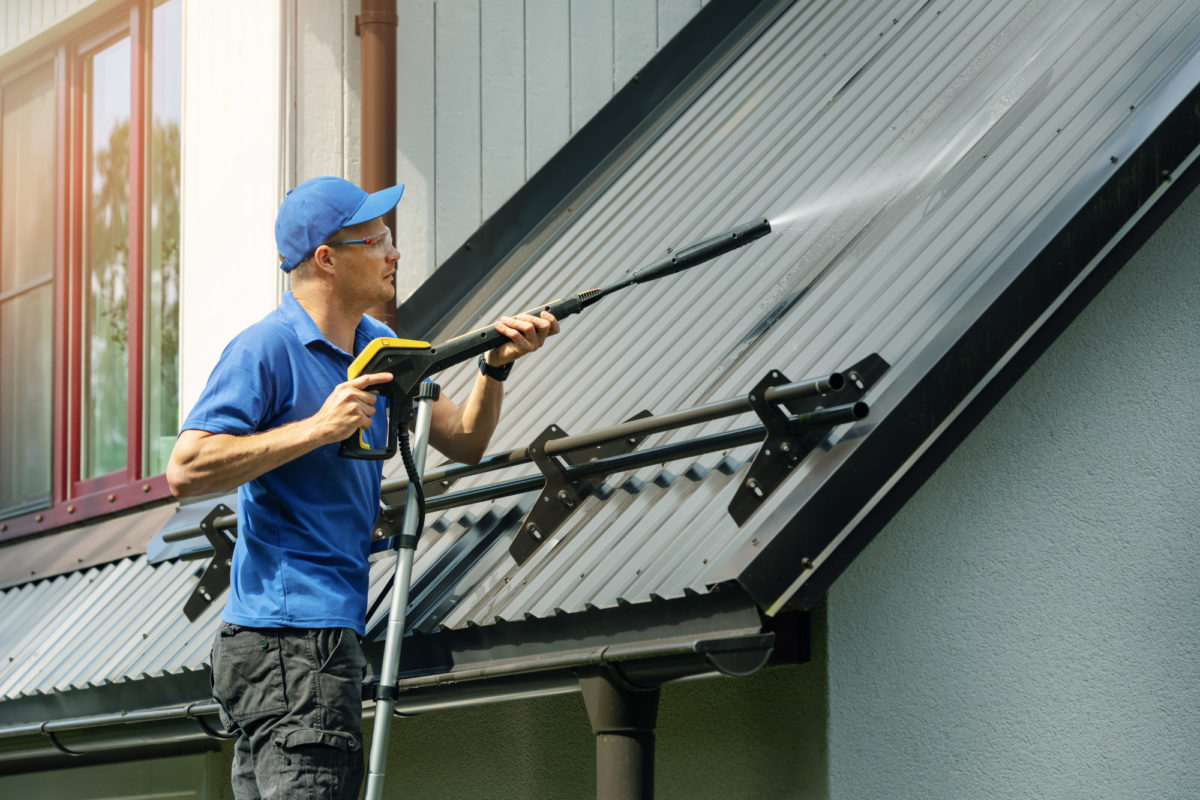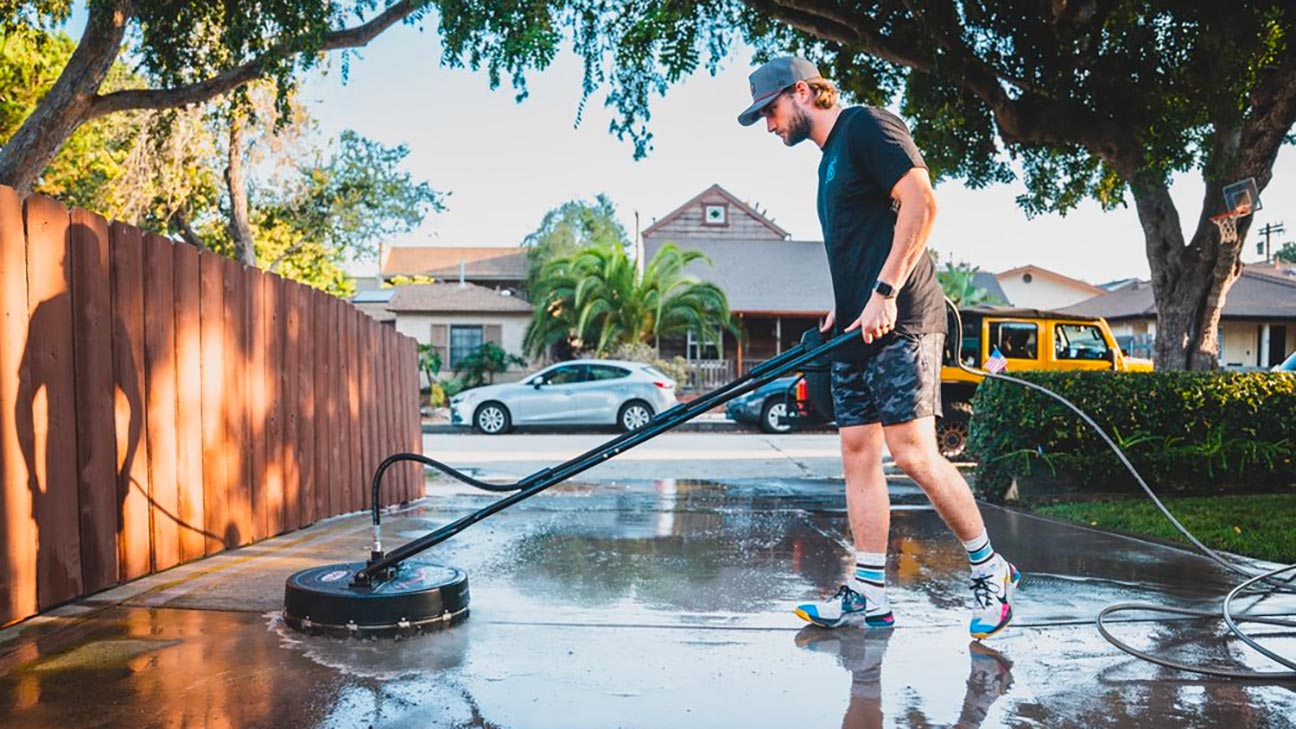The Environmental Advantages of Pressure Washing: A Cleanser Home and Earth
Pressure cleaning is more than just an effective cleaning approach; it symbolizes a commitment to ecological stewardship. By utilizing high-pressure water, this method decreases the dependence on rough chemicals, thus reducing dirt and water contamination. It conserves water sources, making use of significantly less than traditional methods. Past water preservation, pressure washing likewise plays a pivotal duty in enhancing air top quality by removing pollutants and irritants. In addition, it boosts residential or commercial property durability by preventing surface area damage. What usually goes undetected, nonetheless, is how these benefits collectively add to a sustainable and much healthier ecological community. But what are the much deeper ramifications of these advantages?
Reduces Chemical Usage
Lowering chemical usage is among the considerable environmental benefits of pressure cleaning. Traditional cleaning methods typically depend greatly on severe chemicals to properly get rid of dirt, crud, and spots from numerous surface areas. These chemicals can be damaging to the environment, contaminating soil and water sources, and posing risks to both human health and wellness and wildlife. Pressure washing, on the various other hand, uses the power of highly pressurized water to attain the very same, if not much better, cleaning outcomes without the need for these unsafe materials.
The high-pressure water stream can displace and clean away also one of the most stubborn contaminants, such as mold, mildew, algae, and accumulated dirt, from surface areas consisting of driveways, decks, and structure outsides. This lowers the dependence on chemical cleaning agents and solvents, consequently mitigating their environmental impact. Pressure washing ensures that surfaces are not simply ostensibly clean but deeply disinfected, protecting against the need for repeated chemical applications over time. By embracing pressure cleaning, property owners and services can contribute to a cleaner setting, minimize their eco-friendly impact, and promote a healthier ecosystem. This approach exemplifies a sustainable and reliable technique to maintaining cleanliness and hygiene.
Saves Water

A regular yard tube, for circumstances, can use up to 10 gallons of water per minute, whereas pressure washing machines balance around 2-5 gallons per min. This plain distinction shows the water conservation capacity of pressure washing, making it a more lasting selection for organizations and home owners alike. By utilizing pressurized streams, these tools make sure that every decrease of water is used efficiently, reducing overall intake and lessening waste.
Furthermore, the performance of pressure cleaning translates to faster cleaning up times, which further adds to water preservation. Embracing pressure washing not only advertises cleaner surfaces however additionally supports wider ecological sustainability by saving one of our earth's precious sources.
Boosts Air Quality
Pressure washing not only conserves water but likewise significantly improves air top quality, offering one more essential environmental advantage. By removing these contaminants, pressure cleaning straight decreases the amount of harmful fragments launched into the atmosphere.
In addition, pressure washing can aid alleviate the spread of spores and bacteria that thrive in wet, unclean environments - kansas city pressure washing. When surfaces are extensively cleaned, the likelihood of these microbes becoming air-borne is decreased, resulting in a much healthier living environment. This is specifically essential in city areas where air top quality is typically compromised by greater degrees of contamination
By effectively cleaning up surface areas, pressure washing lowers the visibility of these damaging substances, adding to a cleaner and safer atmosphere. Thus, pressure washing plays an essential Get More Info role in improving air high quality and promoting general ecological wellness.

Avoids Surface Damages
The conservation of architectural integrity stands as a vital ecological advantage of pressure washing. Surface areas such as wood, concrete, and brick can gather dust, mold and mildew, algae, and various other impurities gradually. These components are not just unattractive however additionally add to the gradual degeneration of materials. For instance, algae and mold and mildew can keep wetness, which leads to the degeneration of wood structures and the erosion of concrete and brick surfaces. Routine pressure cleaning successfully eliminates these damaging compounds, consequently stopping surface area damages and reducing the requirement for constant repair services or substitutes.
In enhancement to organic pollutants, contaminants like oil, gunk, and oil can likewise settle on surface areas, particularly in commercial and metropolitan atmospheres. These toxins can create discoloration and weaken the architectural elements over time. Pressure washing eliminates these deposits, making certain that the surface areas continue to be intact and robust. By reducing surface area damage, pressure cleaning aids in maintaining the initial stamina and appearance of different materials, therefore adding to a much more environmentally-friendly and lasting living atmosphere. This positive technique to upkeep not only supports the longevity of frameworks but likewise reduces the waste generated from early replacements.
Improves Home Longevity
An essential benefit go to the website of pressure washing is its ability to dramatically improve home longevity. Normal pressure cleaning removes dangerous compounds such as mold and mildew, mildew, algae, and dirt that gather on surfaces over time.
Moreover, the elimination of harsh elements like salt and contaminants from surface areas such as concrete, wood, and steel can stop the onset of rust and degeneration. This proactive maintenance see here now approach guarantees that products like siding, decks, and driveways stay in optimum condition for a longer period. Subsequently, homeowner can prevent constant maintenance cycles and the environmental effect linked with the production and disposal of building products.
Additionally, pressure washing can likewise expand the life of paint and coverings. By keeping surface areas tidy, it lowers the need for frequent repainting, thus saving resources and lessening chemical drainage right into the setting. Overall, pressure washing is a sustainable practice that contributes to both home durability and ecological conservation.
Verdict
In recap, pressure cleaning offers significant environmental advantages by minimizing the dependence on harsh chemicals, saving water, enhancing air quality, and preventing surface damages. This approach not just expands the long life of products yet likewise adds and sustains lasting methods to a healthier ecosystem. By taking on pressure washing, a cleaner home and earth can be attained, consequently promoting both environmental stewardship and the health of bordering neighborhoods.
In addition to decreasing chemical usage, pressure washing additionally saves water, underscoring its ecological advantages. Adopting pressure washing not just promotes cleaner surfaces yet likewise supports wider environmental sustainability by preserving one of our world's precious sources.Pressure cleaning not only preserves water but also substantially enhances air top quality, providing one more crucial ecological advantage. By properly cleaning up surfaces, pressure cleaning decreases the visibility of these dangerous compounds, adding to a cleaner and safer environment.In summary, pressure cleaning offers considerable ecological advantages by lowering the reliance on extreme chemicals, conserving water, enhancing air quality, and stopping surface area damage.